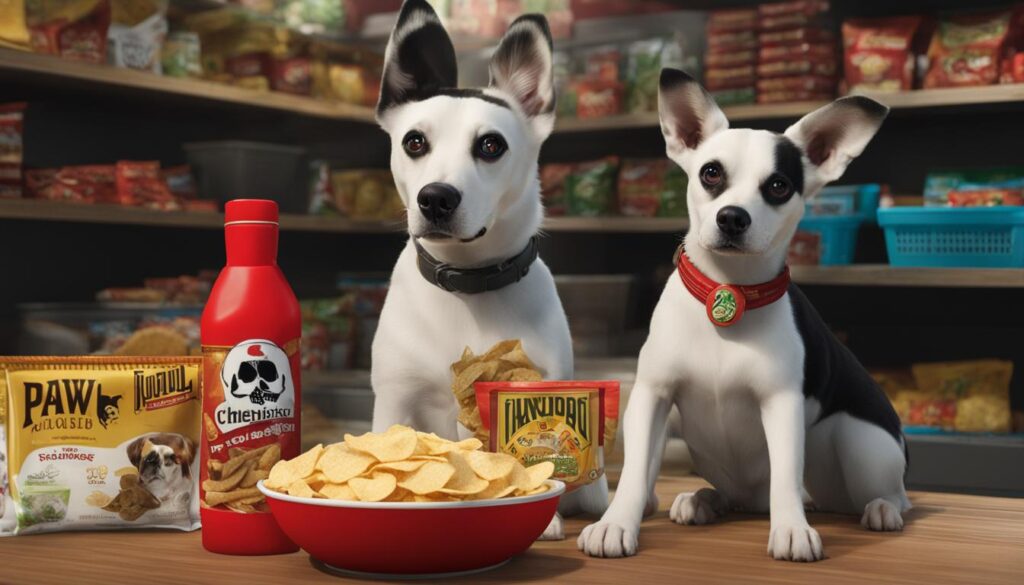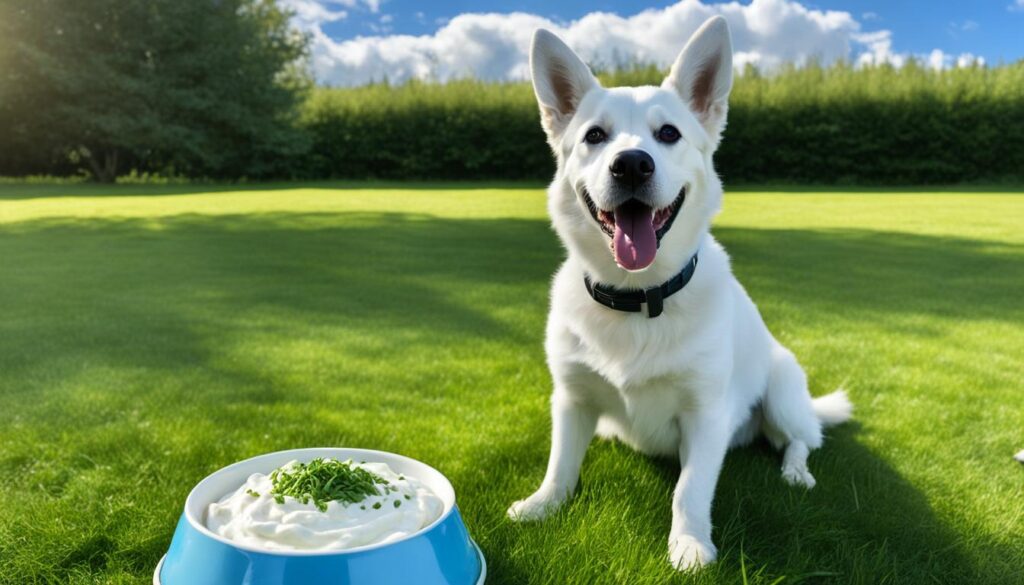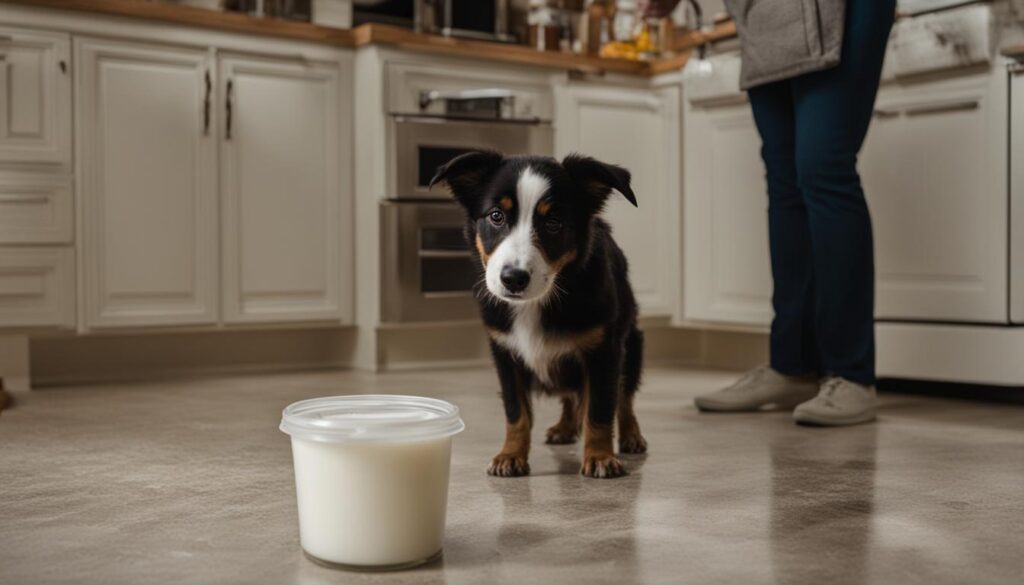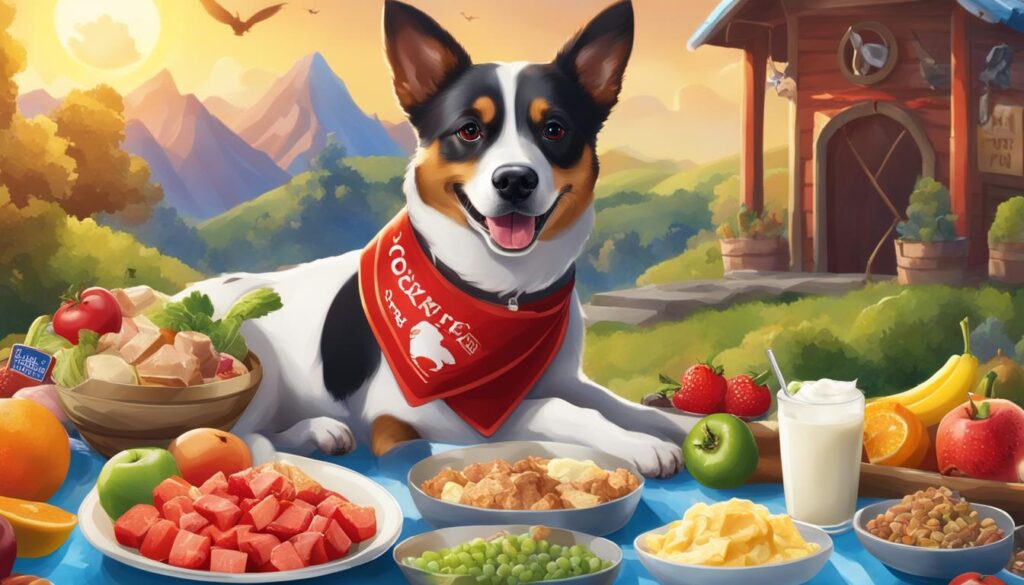When it comes to sharing our favorite foods with our furry friends, it’s important to be cautious and consider their unique dietary needs. One common question that arises is whether dogs can safely consume sour cream. As a professional copywriting journalist, I’ve done the research to provide you with the answers you need.
Dogs can indeed eat sour cream, but there are important factors to consider before offering it to your canine companion. While small amounts of plain, low-fat sour cream can be given as an occasional treat, it’s crucial to be aware of potential health risks, especially if your dog is lactose intolerant or overweight.
It’s worthwhile to explore dog-friendly alternatives to sour cream, as well as the potential digestive issues that can arise from feeding dogs this popular dairy product. Additionally, it’s essential to know which human foods are safe for dogs and which ones should be avoided.
Key Takeaways:
- Plain, low-fat sour cream in small amounts can be safely given to dogs as an occasional treat.
- Avoid sour cream with additional ingredients like onions or chives, as they are harmful to dogs.
- If your dog is lactose intolerant or overweight, it’s best to avoid feeding them sour cream.
- Dog-friendly alternatives to sour cream, such as lite sour cream and plain yogurt, can be healthier options.
- Consult with your veterinarian for personalized advice on feeding sour cream to your dog and maintaining their overall health.
Can Dogs Eat Sour Cream and Onion Chips?

Dogs should never eat sour cream and onion chips or any other foods containing onions. Onions are toxic to dogs and can cause a range of health issues, including anemia and gastrointestinal problems. It’s important to keep all foods containing onions away from dogs to ensure their safety.
If your dog accidentally ingests sour cream and onion chips, it’s crucial to monitor their condition closely. Contact your veterinarian immediately if you notice any symptoms of distress, such as vomiting, diarrhea, or abdominal pain.
The toxic effects of onions on dogs are attributed to a compound called N-propyl disulfide, which can damage a dog’s red blood cells and lead to anemia. Furthermore, consumption of onions can also cause gastrointestinal upset, including nausea, abdominal pain, and diarrhea.
Quote: “Dogs should never be fed sour cream and onion chips or any other dips containing onions.”
It’s important for dog owners to be aware of the harmful effects of onions and take preventive measures to ensure their furry friends are not exposed to such toxic foods. By keeping onions and foods containing onions out of your dog’s reach, you can help safeguard their health and well-being.
Can Dogs Eat Sour Cream and Chives?

Dogs should not consume sour cream and chives in any form. Chives are part of the onion family, and like onions, they can be toxic to dogs. Even small amounts of chives can cause gastrointestinal upset and other health issues in dogs. It’s best to avoid feeding dogs any foods that contain chives.
Effects of Chives on Dogs
Chives, along with other members of the onion family, contain a compound called thiosulfate. This compound can cause oxidative damage to a dog’s red blood cells, leading to anemia. Ingesting chives can also irritate a dog’s digestive system, causing symptoms such as vomiting, diarrhea, and abdominal pain. In severe cases, chive ingestion can result in organ damage or even be fatal to dogs.
Safe Alternatives to Chives
While chives should be avoided, there are many dog-friendly herbs and spices that can be used to add flavor to your dog’s meals. Some safe options include parsley, basil, oregano, and rosemary. These herbs can provide a natural and healthy way to enhance the taste of your dog’s food without posing any risks to their health.
| Food | Safety for Dogs |
|---|---|
| Sour Cream and Chives | Toxic – Should be avoided |
| Sour Cream (Plain, Low-Fat) | Safe in small amounts |
| Lite Sour Cream | Safer alternative, but should still be limited |
| Parsley, Basil, Oregano, Rosemary | Safe herbs to add flavor |
It’s important to remember that every dog is different, and some may have underlying health conditions or sensitivities that make them more susceptible to the harmful effects of certain foods. If you suspect that your dog has ingested chives or any other toxic foods, it’s crucial to seek immediate veterinary care.
Can Dogs Eat Sour Cream and Onion Dip?
When it comes to sour cream and onion dip, it is essential to keep it far away from your furry friend. Onion-containing foods, like sour cream and onion dip, pose significant risks to dogs and should never be fed to them.
Onions, whether cooked, raw, or in powdered form, contain compounds that are toxic to dogs. These compounds can cause damage to a dog’s red blood cells, leading to anemia, gastrointestinal distress, and even more severe health problems.
Feeding your dog sour cream and onion dip can result in digestive issues, such as vomiting and diarrhea. Additionally, the harmful effects of onions can be long-lasting and may require veterinary intervention.
It is crucial to be aware of other onion-containing foods and ingredients that shouldn’t be given to dogs. These include onion powder, garlic, onion soup mix, and any dishes seasoned with onions or onion-based products.
To minimize the risk of accidental ingestion, it’s essential to store all foods containing onions in secure containers or places that are inaccessible to your dog.
“Onions can be highly toxic to dogs and cause severe health problems. It’s best to keep all onion-containing foods away from your beloved pet.”
Foods Containing Onions
| Food Item | Potential Risks |
|---|---|
| Sour Cream and Onion Dip | Damage to red blood cells, digestive issues |
| Onion Powder | Anemia, gastrointestinal distress |
| Garlic | Hemolytic anemia, gastrointestinal upset |
| Onion Soup Mix | Avoidance is recommended |
| Dishes Seasoned with Onions | Unintentional ingestion can cause harm |
As responsible dog owners, it is our duty to prioritize our pets’ health and well-being. Avoid feeding your dog sour cream and onion dip and be vigilant about keeping all onion-containing foods out of their reach.
For more information on foods that are toxic or safe for dogs, consult with your veterinarian or refer to reputable sources dedicated to dog nutrition and wellness.
My Dog Ate Sour Cream – What Do I Do?

If your dog accidentally eats sour cream, it’s important to assess the situation and monitor their behavior. While small amounts of sour cream are generally safe for dogs, consuming a large quantity or certain types of sour cream can potentially cause health issues.
If your dog has ingested a large amount of sour cream or if they are showing signs of distress, such as vomiting or diarrhea, it is recommended to contact your veterinarian for further guidance. They will be able to provide appropriate advice based on your dog’s specific situation.
In most cases, if your dog has consumed a small amount of sour cream, they may experience minor digestive issues such as gas or an upset stomach. Typically, these symptoms will resolve on their own within a short period of time.
Signs of Sour Cream Intolerance in Dogs:
- Upset stomach
- Gas
- Diarrhea
These symptoms may indicate that your dog is intolerant to sour cream or may have difficulty digesting it properly. If you notice any of these signs persisting or worsening, it’s best to consult with your veterinarian for a proper diagnosis and guidance.
Remember, every dog is unique, and their tolerance to certain foods may vary. It’s always important to be aware of what your dog consumes and to introduce new foods in small quantities to monitor their reaction.
| Symptoms of Sour Cream Intolerance in Dogs | What to Do |
|---|---|
| Gastric distress (upset stomach, gas) | -Monitor your dog’s behavior and provide access to plenty of fresh water. -If symptoms worsen or persist, consult with your veterinarian. |
| Diarrhea | -Keep an eye on your dog’s bowel movements. If diarrhea continues or becomes severe, seek veterinary advice. -Ensure your dog stays hydrated by offering water frequently. |
If your dog accidentally eats sour cream, it’s important to assess the situation and monitor their behavior. If a large amount was consumed or if your dog is showing signs of distress, such as vomiting or diarrhea, contact your veterinarian for guidance. In most cases, small amounts of sour cream will likely only cause minor digestive issues, such as gas or an upset stomach.
In any case, it’s better to be safe than sorry. If you have any concerns about your dog’s health or their reaction to sour cream, consulting with a veterinarian is always recommended.
How to Safely Feed Your Dog Sour Cream

Feeding sour cream to your dog can be done safely by following a few guidelines. It’s important to choose the right type of sour cream and introduce it gradually to your dog’s diet. Here are some steps to ensure your dog can enjoy sour cream without any adverse effects.
- Choose plain, low-fat sour cream: Opt for plain sour cream that is low in fat and free from added ingredients like onions or chives. This will minimize the risk of digestive issues or toxicity in dogs.
- Start with small amounts: When introducing sour cream to your dog, begin with a small portion to gauge their tolerance and any potential lactose intolerance. Monitor their response closely for any signs of digestive upset or discomfort.
- Observe for digestive issues: Pay attention to how your dog’s stomach handles the sour cream. Signs of digestive issues such as diarrhea, vomiting, or excessive gas may indicate that sour cream is not suitable for their digestive system.
- Occasional treat only: Sour cream should never be a regular part of your dog’s diet. It is high in fat and calories, so limit the amount given and reserve it as an occasional treat.
- Do not exceed recommended serving sizes: Avoid overfeeding your dog sour cream. Stick to the recommended serving sizes based on your dog’s size and weight to prevent weight gain and potential health problems.
“Feeding sour cream to your dog can be done safely by following a few guidelines.”
Remember that every dog is unique, and some may have specific sensitivities or intolerances to certain foods. If you have any concerns about feeding sour cream to your dog or notice any adverse reactions, consult with your veterinarian for personalized advice.
The Benefits of Sour Cream for Dogs

While sour cream doesn’t offer significant health benefits for dogs, it does contain calcium, which is essential for bone health. However, there are better sources of calcium for dogs, such as yogurt and spinach. The trace amounts of other vitamins and minerals in sour cream are not sufficient to have a significant impact on a dog’s overall health.
Calcium plays a vital role in promoting strong bones and teeth in dogs. It is especially important for growing puppies and senior dogs who may be more prone to bone-related issues. However, relying solely on sour cream to fulfill a dog’s calcium needs is not recommended. Other food options, such as calcium-rich fruits and vegetables, can provide a more substantial and balanced source of essential nutrients.
Yogurt, for example, is not only rich in calcium but also contains probiotics that promote a healthy digestive system in dogs. Probiotics can help regulate bowel movements and maintain a balanced gut flora, leading to improved overall health. Additionally, yogurt is often easier for dogs to digest compared to sour cream, making it a safer and more beneficial option.
Spinach is another excellent source of calcium for dogs. This leafy green vegetable contains a variety of essential nutrients, including calcium, iron, and vitamins A and C. Adding a small amount of cooked, plain spinach to your dog’s diet can provide beneficial nutrients without the high fat content associated with sour cream.
It’s important to note that while sour cream can be safely given to dogs in moderation, relying on it as a primary calcium source may result in excessive fat intake. High fat content in a dog’s diet can lead to obesity, pancreatitis, and other health issues. Therefore, it’s best to consult with your veterinarian for specific recommendations on meeting your dog’s nutritional needs.
Drawbacks of Feeding Dogs Sour Cream
Feeding dogs sour cream should be done in moderation due to its high fat and calorie content. Regular and excessive consumption can lead to weight gain and potential health issues like obesity and heart problems. Sour cream should only be given as an occasional treat and should never be a regular part of a dog’s diet.
While dogs may enjoy the creamy and tangy taste of sour cream, it’s important to recognize the drawbacks associated with feeding it to our furry friends. One of the main concerns is the high fat content found in sour cream. This high fat content can contribute to weight gain in dogs, which can lead to various health problems, including obesity and an increased risk of heart disease.
Additionally, sour cream is calorie-dense, meaning it contains a significant amount of calories in a relatively small serving size. Overfeeding sour cream to dogs can easily contribute to their overall daily calorie intake, potentially causing weight gain and related health issues.
It’s important to note that dogs have different nutritional needs compared to humans. While sour cream may be a tasty treat for us, it shouldn’t be a regular part of a dog’s diet. Instead, it should be offered sparingly, if at all, and in small portions to avoid the risk of overconsumption and associated health problems.
To put it simply, sour cream should be viewed as a special treat for your dog rather than a staple in their diet. There are healthier and more suitable options available that can provide similar indulgence without the drawbacks. It’s always best to consult with your veterinarian to establish a balanced and appropriate diet for your dog, ensuring their overall health and well-being.
Sour Cream Alternatives for Dogs

While sour cream can be enjoyed by dogs in small amounts, there are also alternative options that can provide similar flavors and textures without the potential risks associated with regular sour cream. Here are a few dog-friendly substitutes to consider:
1. Lite Sour Cream
Lite sour cream is a healthier alternative as it has reduced fat and calories compared to traditional sour cream. This can be a great option for dogs who need to watch their weight or as a lower-calorie treat option.
2. Plain Yogurt
Another dog-friendly substitute for sour cream is plain yogurt. It offers similar creamy texture and can be a good source of probiotics, which are beneficial for a dog’s digestive system. When choosing yogurt, opt for plain varieties without any added sugars or artificial sweeteners.
These alternatives can be given to dogs in moderation, ensuring that they are introduced gradually and in appropriate serving sizes. As with any new food, it’s important to monitor your dog’s response and consult with your veterinarian if you have any concerns or questions.
Wrapping Up
In conclusion, dogs can safely enjoy small amounts of sour cream as an occasional treat. However, it is essential to consider their individual tolerance and potential health risks. Dogs with lactose intolerance may experience digestive issues when consuming sour cream, so it’s crucial to monitor their reactions.
Plain, low-fat sour cream is the safest option for dogs, as it contains fewer calories and less fat. For those looking for alternative options, lite sour cream and plain yogurt can serve as healthier substitutes.
It is important to note that sour cream with added ingredients like onions or chives should be strictly avoided, as they are toxic to dogs and can cause serious health issues.
When introducing any new food to your dog’s diet, including sour cream or its alternatives, consulting with a veterinarian is always recommended to ensure your dog’s safety and dietary needs are met.
| Sour Cream Benefits for Dogs | Drawbacks of Feeding Dogs Sour Cream |
|---|---|
|
|
While sour cream can offer some benefits, such as calcium, there are better sources of essential nutrients for dogs. Yogurt and spinach, for example, are healthier options for providing calcium in a dog’s diet.
Remember to prioritize your dog’s overall health and well-being when choosing treats and feeding them sour cream or other human foods. Moderation is key, and always consult with your veterinarian for personalized advice and guidance.
More Dog Food Resources
If you’re looking for more information on dog food, nutrition, and safe foods for dogs, consider checking out the following resources:
- Your veterinarian: They can provide personalized advice and recommendations based on your dog’s specific needs.
- Reputable dog food websites and publications: These sources can offer valuable insights into dog nutrition, safe food options, and the potential risks associated with certain foods.
Final Thoughts
Feeding dogs requires responsible decision-making to ensure their health and well-being. While dogs can safely consume sour cream, it should be given in moderation and with consideration for their individual needs and potential health risks. Opting for dog-friendly alternatives and maintaining a balanced diet are essential for promoting their overall health and happiness.
More Dog Food Resources
If you’re looking for more information on dog food, nutrition, and safe foods for dogs, there are several resources available. Consult with your veterinarian for personalized advice and recommendations. Additionally, reputable dog food websites and publications can provide valuable insights into dog nutrition, safe food options, and the potential risks associated with certain foods.
Top Dog Food Resources:
- The American Society for the Prevention of Cruelty to Animals (ASPCA) – www.aspca.org: This organization offers a wealth of information on dog nutrition, including articles and guides on choosing the right food for your dog’s specific needs.
- The American Kennel Club (AKC) – www.akc.org: As a reputable authority on dog breeds, the AKC also provides resources on dog nutrition and proper feeding practices. They have informative articles and expert advice to help you make informed decisions about your dog’s diet.
- Dog Food Advisor – www.dogfoodadvisor.com: This independent website offers unbiased reviews and ratings for various dog food brands. They provide detailed analysis of ingredients, nutritional value, and potential allergens to help you choose the best food for your dog.
- Canine Journal – www.caninejournal.com: Canine Journal covers a wide range of topics related to dog care, including nutrition. They offer articles, reviews, and useful tips to help you navigate the world of dog food and make informed choices.
“Proper nutrition plays a crucial role in maintaining a dog’s health and well-being. It’s important to ensure they receive a balanced diet that meets their specific nutritional needs.”
These resources can serve as excellent references when it comes to dog nutrition and safe food options. Remember, always consult with your veterinarian for personalized advice tailored to your dog’s specific needs and health conditions. By being well-informed about dog nutrition, you can make confident decisions about what to feed your furry friend.
Final Thoughts
When it comes to responsible dog feeding, prioritizing your dog’s health and well-being should be the top priority. While dogs can safely enjoy sour cream as an occasional treat, it’s important to consider their individual dietary needs and any potential health risks involved.
Providing safe treats for dogs is crucial, and opting for dog-friendly alternatives to sour cream can be a healthier choice. Lite sour cream, with reduced fat and calories, can still satisfy your dog’s taste buds without the potential risks associated with regular sour cream. Additionally, plain yogurt provides similar flavors and textures while offering probiotics that can benefit your dog’s digestive system.
However, it’s important to remember that sour cream should never replace a balanced and nutritious diet for your dog. Consulting with a veterinarian will help you determine appropriate dog diet guidelines and ensure that the foods you offer are safe and beneficial for your furry friend. They can provide personalized advice based on your dog’s specific needs and help you navigate the wide array of information available regarding dog nutrition.
In conclusion, while dogs can enjoy sour cream in moderation, responsible dog feeding means considering their individual needs and prioritizing their health. Opt for safe treats like lite sour cream or plain yogurt, and always consult with your veterinarian for guidance on what foods are safe and appropriate for your dog. By doing so, you can provide a healthier and more balanced diet, promoting the overall well-being of your beloved pet.
FAQ
Is Sour Cream Safe for Dogs to Eat?
Dogs can safely eat sour cream, but it’s important to be cautious with the amount they consume, especially if they are lactose intolerant or overweight. Plain, low-fat sour cream is the best option for dogs, and small amounts can be given as an occasional treat.
Can Dogs Eat Sour Cream and Onion Chips?
No, dogs should never eat sour cream and onion chips or any other foods containing onions. Onions are toxic to dogs and can cause a range of health issues, including anemia and gastrointestinal problems.
Can Dogs Eat Sour Cream and Chives?
No, dogs should not consume sour cream and chives in any form. Chives are part of the onion family, and like onions, they can be toxic to dogs. Even small amounts of chives can cause gastrointestinal upset and other health issues in dogs.
Can Dogs Eat Sour Cream and Onion Dip?
No, dogs should never be fed sour cream and onion dip or any other dips containing onions. Onions are highly toxic to dogs and can cause serious health problems, such as damage to red blood cells and gastrointestinal distress.
My Dog Ate Sour Cream – What Do I Do?
If your dog accidentally eats sour cream, it’s important to assess the situation and monitor their behavior. If a large amount was consumed or if your dog is showing signs of distress, such as vomiting or diarrhea, contact your veterinarian for guidance. In most cases, small amounts of sour cream will likely only cause minor digestive issues, such as gas or an upset stomach.
How to Safely Feed Your Dog Sour Cream
To safely feed your dog sour cream, it’s essential to choose plain, low-fat sour cream and introduce it gradually. Start with a small amount to see how your dog tolerates it, especially if you’re unsure about their lactose intolerance. Monitor your dog for any signs of digestive issues, and if they handle it well, you can give small amounts as an occasional treat. However, it’s important not to exceed recommended serving sizes, as sour cream is high in fat and calories.
The Benefits of Sour Cream for Dogs
While sour cream doesn’t offer significant health benefits for dogs, it does contain calcium, which is essential for bone health. However, there are better sources of calcium for dogs, such as yogurt and spinach. The trace amounts of other vitamins and minerals in sour cream are not sufficient to have a significant impact on a dog’s overall health.
Drawbacks of Feeding Dogs Sour Cream
Feeding dogs sour cream should be done in moderation due to its high fat and calorie content. Regular and excessive consumption can lead to weight gain and potential health issues like obesity and heart problems. Sour cream should only be given as an occasional treat and should never be a regular part of a dog’s diet.
Sour Cream Alternatives for Dogs
There are alternatives to sour cream that can be safely given to dogs. Lite sour cream, which has reduced fat and calories, can be a healthier option. Additionally, plain yogurt can provide similar flavors and textures while offering probiotics that are beneficial for a dog’s digestive system.
More Dog Food Resources
If you’re looking for more information on dog food, nutrition, and safe foods for dogs, there are several resources available. Consult with your veterinarian for personalized advice and recommendations. Additionally, reputable dog food websites and publications can provide valuable insights into dog nutrition, safe food options, and the potential risks associated with certain foods.
Final Thoughts
When it comes to feeding dogs, it’s crucial to prioritize their health and well-being. While dogs can eat sour cream in moderation, it’s important to consider their individual dietary needs and any potential health risks. Opting for dog-friendly alternatives and providing a balanced diet are essential for ensuring their overall health. Always consult with your veterinarian for guidance on what foods are safe and appropriate for your dog.






